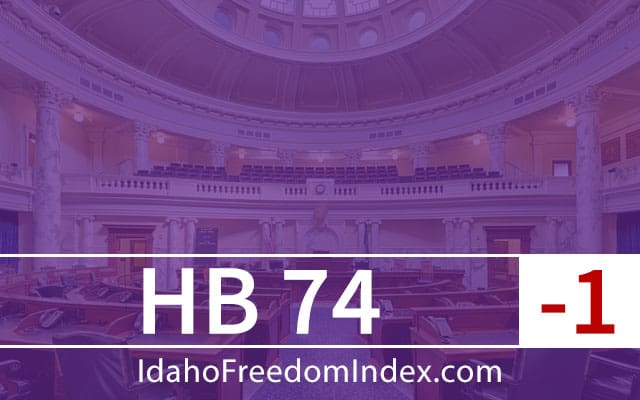


Bill description: HB 74 would change requirements and restrictions for off-highway vehicles and would give the Department of Parks and Recreation additional authority.
Rating: -1
Does it directly or indirectly create or increase penalties for victimless crimes or non-restorative penalties for non- violent crimes? Conversely, does it eliminate or decrease penalties for victimless crimes or non-restorative penalties for non-violent crimes?
If an OHV operator causes more than $200 in damage while driving their vehicle, they are obligated to notify a law enforcement agency within five days. HB 74 would specify that if the operator only causes damage to their own vehicle, and does not damage other property, they would not have to report it to law enforcement (page 10, lines 10-12).
(+1)
Does it directly or indirectly create or increase any taxes, fees, or other assessments? Conversely, does it eliminate or reduce any taxes, fees, or other assessments?
HB 74 would institute a $22.50 registration fee for all OHVs used as rentals (page 13, lines 4-8). Currently, these OHVs are charged the same $12 registration fee that other OHVs are charged. This additional registration fee for rentals would be assessed regardless of the amount the OHV is used; it would be based merely on the fact that it is offered for rent.
(-1)
HB 74 would allow the owners of OHVs to renew their vehicles for two years at a time rather than just one (page 15, line 33 - page 16, line 8). This would be similar to the option people have to register their cars with the DMV for two years rather than one. If the owner chooses to renew for two years, they would pay double the annual fee. By allowing owners of OHVs this option, HB 74 would reduce the bureaucratic burden of registering these vehicles every year.
(+1)
Does it increase government redistribution of wealth? Examples include the use of tax policy or other incentives to reward specific interest groups, businesses, politicians, or government employees with special favors or perks; transfer payments; and hiring additional government employees. Conversely, does it decrease government redistribution of wealth?
Under current state law, the Idaho Department of Parks and Recreation can use OHV registration fees to purchase easements, permits, land, or leases on private, state or federal land. The department can also use the money to construct, develop, or maintain trails and facilities on state or federal lands.
HB 74 would allow the department to use the money collected from registration fees to build trails or recreational facilities on private land as well (page 14, line 27). This would allow private individuals to benefit greatly at the expense of all the others who pay registration fees.
This system would be ripe for abuse. For example, a well-connected landowner might convince the department to put a trail on their own private property, which would connect their home or land to the rest of the trail system. All this could be done at others’ expense and not the landowners.
(-1)
Does it transfer a function of the private sector to the government? Examples include government ownership or control of any providers of goods or services such as the Land Board's purchase of a self-storage facility, mandatory emissions testing, or pre-kindergarten. Conversely, does it eliminate a function of government or return a function of government to the private sector?
By giving the state the authority to develop and maintain recreational facilities and trails on private land, HB 74 would transfer a function of the private sector to the government. Currently, private individuals, associations, or organizations pay to develop trails on private land. The same is true for recreational facilities: While a landowner or organization might build an outbuilding for use by their members or the general public, HB 74 would give the state authority to take on that project.
(-1)


